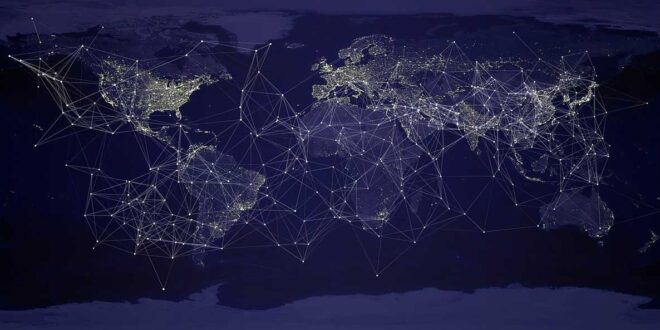Muhammad Abbas
Globalization still has all of its ingredients but over the period of time, the globe has been shifted to take advantage of this transnational, multilateral and borderless system, thereby the countries used to be at advantageous side sliding into less advantageous position which makes them aggrieved of that system.
Globalization is erroneously labeled as the product of western endeavors. Conversely, All the nations contributed to achieve this in their domains. Alexander’s expedition to Persia and then to the subcontinent from Macedonia had spearheaded globalization. The invention of the wheel literally augmented the pace with which this system started to transcend the borders, but it was also accompanied by the invention of Zero to expedite it. As zero was invented in the subcontinent and then traveled to the Arab world with the conquest of Sindh by Arabs, and by employing this novel zero, Al Khwarizmi developed algebra. All these events contributed to globalization. It’s not over yet. The great invention of printing in dynastic China eons before the emergence of the Gutenberg press in France. This press had extricated the European from dark ages to the age of enlightenment, which was the start of globalization. The invention of gunpowder and tools in dynastic China had also contributed in its domain. All these inventions that triggered the system were invented by different nations which alluded something else.
Now, it’s become evident that globalization was never been given by a single nation as often deemed as the western gift, contrarily, globalization is the Global heritage, as the Global world contributed to it from sinic civilization to Muslim civilization and from Muslim civilization to ancient Greek civilization. Global east also contributed as much as the global west did. Therefore, globalization was the international heritage, which should have a certain date of birth.
Now it’s expedient to define a single moment which could be deemed as the birth of globalization to avoid the confusion. Paul Kennedy, asserted in his book entitled ” The rise and fall of the great powers”, that 1501 was the watershed moment of human history and the start of globalization. After diving deep into the evidence of the contribution to globalization from all over the global world, then one can better deal with the question why globalization is often deemed as the Western heritage. It’s now imperative to deal with this.
All the progress in human history after 1501 was achieved by the global west solely. Since all the aspects of globalization that was witnessed by the world were bestowed upon the world by the West, which over the period of time, monopolized the forces of globalization thereby it’s become the Western heritage despite the fact established hitherto. Up till now, the west had achieved the monopoly, it was the high time to reap the harvest.
So, from 1453, when it was the beginning of the age of enlightenment and from 1492, the age of exploration, Portuguese navigator, Vasco da gama, discovered the routes from Western Europe to the East by the way of cape of good hope, and in 1498, an Italian explorer, Christopher Columbus’ voyages were followed the same suit. Ruefully, these discoveries were not lucrative for the natives of the newly explored place as the explorers deemed themselves as the superior in terms of techniques and prowess to navigate, they started to colonize the different parts of world to extract the great fortunes the aboriginals would have had. It can also be marked as the beginning of colonialism.
Over the period of time, the explorers colonized central, latin and north America. On September 31,1599 charter was granted by the queen of Great Britain to the EIC, the Red dragon harboured on the subcontinent in 1608. These 800 men eventually created an empire till 1757 after the Battle of Plassey. In this time frame, the west was witnessing the emergence of enlightenment, science, reason alone with the beginning of the industrial revolution. Nonetheless, it’s quite safe to assert that the industrial revolution was emerging while callously extracting and exploiting the natural, human and other resources from their colonies. As renowned Shashi tharoor claimed in his book inglorious empire that India’s share of global GDP plummeted from 23 per cent when they entered India to only 4 per cent by the time they left.
At that time, it was both advantageous and inevitable for the globalizers or better called the colonizers to unbridledly extract that resources to keep the industry manufacturing; the wheel, running. To legitimize this callous exploitation, Adim smith’s theory of laissez faire, free trade market economy and free flow of goods was sufficient. Meanwhile, after the American declaration of independence in 1776, all were in favor of the west till 2008 and with the boom of globalization coupled with the industrial revolution in 1908.
After 2008, the Globe has started to shift therefore the West that was once at the advantageous side seems slipping to the less advantageous side. Globalization is the same as the principal forces remain unaltered but what has been changed is who will be more advantageous than the others.
In the last fifty years, Global East, more precisely after the end of colonialism from 1945, emerged to take the benefits from globalization, evidently, the rise of Japan from ashes, Hong Kong, Singapore, Malaysia, China and India. The indicators like GDP, industries, production and infrastructural development corroborate the assertion. This world order is surely not acceptable to the west who reckon globalization as their heritage therefore it should always be favourable to them. Surely it is a flawed aspiration.
Due to this discontentment, the West has recently been mired in the quagmire of populism, hyper nationalism, inter alia, Brexit. In the form of these appearances, the west has been shrugging the shoulders from the responsibility of the damage they have done to the environment, to the nations and to the Global world by exploitation and extraction.
Now logically it comes to mind why globalization has turned on to the west. Drivers behind making the west wary of it are like the improvement in the living standards of people, dwindling number of the working class which have always been the inevitable for prosperity and development. Demands for increasing the wages, leaves, and for better working conditions, and stringent environmental restrictions, all these made the west less advantageous of globalization. The forces of it are ineluctable and irrevocable.
As of today, humanity has been exposed to the existential threats and Global problems which need Global solution. As the recent apocalyptic pandemic, COVID 19, more recently the resurgence of AIDS, malaria, and monkeypox, and the worsening climate change, all these threats know no boundaries, therefore it’s the need of hour to draft the system for concerted effort which ought not knows borders as well.
Succinctly, globalization is the global heritage which alludes that no single nation, civilization or region is entitled to reap the harvest of it at the expense of others exploitation. The recent shifts in the global world order, the Global East has become more advantageous than the global west which makes the letter wary of the promises of globalization. Therefore we have recently witnessed the rise of inward marching, Brexit, trumpism, hyper nationalism and others. But it’s established that the principal forces of globalization are inevitable and invincible. The Global problems the world is exposed to are direly need the global solutions instead of scattered, individual, national or regional ones.
 Geostrategic Media Political Commentary, Analysis, Security, Defense
Geostrategic Media Political Commentary, Analysis, Security, Defense





